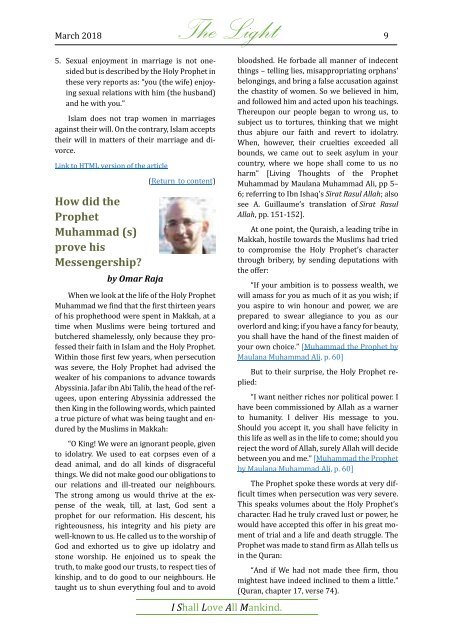The Light 2018 03 March issue
English organ of the Ahmadiyya Anjuman Ishaat Islam. Presenting Islam as taught by the Holy Prophet Muhammad (s) as a tolerant, peaceful, inclusive, loving, rational religion. To learn more go to www.virtualmosque.co.uk
English organ of the Ahmadiyya Anjuman Ishaat Islam. Presenting Islam as taught by the Holy Prophet Muhammad (s) as a tolerant, peaceful, inclusive, loving, rational religion. To learn more go to www.virtualmosque.co.uk
You also want an ePaper? Increase the reach of your titles
YUMPU automatically turns print PDFs into web optimized ePapers that Google loves.
<strong>March</strong> <strong>2018</strong> <strong>The</strong><br />
<strong>Light</strong> 9<br />
5. Sexual enjoyment in marriage is not onesided<br />
but is described by the Holy Prophet in<br />
these very reports as: “you (the wife) enjoying<br />
sexual relations with him (the husband)<br />
and he with you.”<br />
Islam does not trap women in marriages<br />
against their will. On the contrary, Islam accepts<br />
their will in matters of their marriage and divorce.<br />
Link to HTML version of the article<br />
How did the<br />
Prophet<br />
Muhammad (s)<br />
prove his<br />
Messengership?<br />
by Omar Raja<br />
(Return_to content)<br />
When we look at the life of the Holy Prophet<br />
Muhammad we find that the first thirteen years<br />
of his prophethood were spent in Makkah, at a<br />
time when Muslims were being tortured and<br />
butchered shamelessly, only because they professed<br />
their faith in Islam and the Holy Prophet.<br />
Within those first few years, when persecution<br />
was severe, the Holy Prophet had advised the<br />
weaker of his companions to advance towards<br />
Abyssinia. Jafar ibn Abi Talib, the head of the refugees,<br />
upon entering Abyssinia addressed the<br />
then King in the following words, which painted<br />
a true picture of what was being taught and endured<br />
by the Muslims in Makkah:<br />
“O King! We were an ignorant people, given<br />
to idolatry. We used to eat corpses even of a<br />
dead animal, and do all kinds of disgraceful<br />
things. We did not make good our obligations to<br />
our relations and ill-treated our neighbours.<br />
<strong>The</strong> strong among us would thrive at the expense<br />
of the weak, till, at last, God sent a<br />
prophet for our reformation. His descent, his<br />
righteousness, his integrity and his piety are<br />
well-known to us. He called us to the worship of<br />
God and exhorted us to give up idolatry and<br />
stone worship. He enjoined us to speak the<br />
truth, to make good our trusts, to respect ties of<br />
kinship, and to do good to our neighbours. He<br />
taught us to shun everything foul and to avoid<br />
I Shall Love All Mankind.<br />
bloodshed. He forbade all manner of indecent<br />
things – telling lies, misappropriating orphans’<br />
belongings, and bring a false accusation against<br />
the chastity of women. So we believed in him,<br />
and followed him and acted upon his teachings.<br />
<strong>The</strong>reupon our people began to wrong us, to<br />
subject us to tortures, thinking that we might<br />
thus abjure our faith and revert to idolatry.<br />
When, however, their cruelties exceeded all<br />
bounds, we came out to seek asylum in your<br />
country, where we hope shall come to us no<br />
harm” [Living Thoughts of the Prophet<br />
Muhammad by Maulana Muhammad Ali, pp 5–<br />
6; referring to Ibn Ishaq’s Sirat Rasul Allah; also<br />
see A. Guillaume’s translation of Sirat Rasul<br />
Allah, pp. 151-152].<br />
At one point, the Quraish, a leading tribe in<br />
Makkah, hostile towards the Muslims had tried<br />
to compromise the Holy Prophet’s character<br />
through bribery, by sending deputations with<br />
the offer:<br />
“If your ambition is to possess wealth, we<br />
will amass for you as much of it as you wish; if<br />
you aspire to win honour and power, we are<br />
prepared to swear allegiance to you as our<br />
overlord and king; if you have a fancy for beauty,<br />
you shall have the hand of the finest maiden of<br />
your own choice.” [Muhammad the Prophet by<br />
Maulana Muhammad Ali, p. 60]<br />
But to their surprise, the Holy Prophet replied:<br />
“I want neither riches nor political power. I<br />
have been commissioned by Allah as a warner<br />
to humanity. I deliver His message to you.<br />
Should you accept it, you shall have felicity in<br />
this life as well as in the life to come; should you<br />
reject the word of Allah, surely Allah will decide<br />
between you and me.” [Muhammad the Prophet<br />
by Maulana Muhammad Ali, p. 60]<br />
<strong>The</strong> Prophet spoke these words at very difficult<br />
times when persecution was very severe.<br />
This speaks volumes about the Holy Prophet’s<br />
character. Had he truly craved lust or power, he<br />
would have accepted this offer in his great moment<br />
of trial and a life and death struggle. <strong>The</strong><br />
Prophet was made to stand firm as Allah tells us<br />
in the Quran:<br />
“And if We had not made thee firm, thou<br />
mightest have indeed inclined to them a little.”<br />
(Quran, chapter 17, verse 74).














